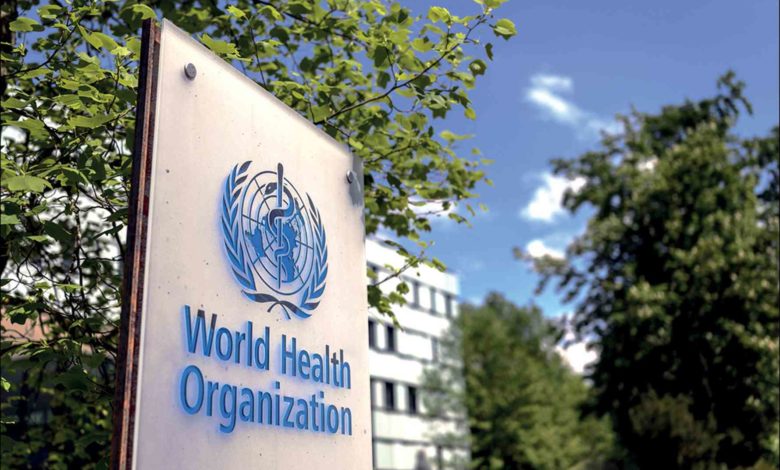
Contractual Arrangement: Fixed-term appointment
Contract Duration (Years, Months, Days): 2 years
Closing Date: Apr 25, 2024, 11:59:00 PM
Primary Location: Gambia-Banjul
Organization: AF_GMB Gambia
Schedule : Full-time
BACKGROUND
Founded in 1948, the World Health Organization (WHO) is the United Nations agency dedicated to global health and safety. The Organization connects nations, partners and communities to promote health and serve the vulnerable.
Join Our UN WhatsApp Groups for Updates | Join Our WhatsApp Channel for UN Jobs Updates
Purpose of the Position
Within the Country Management Support Unit, to provide support and services in the preparation of pre-requisites and the initiation of Human Resources related transaction in GSM (position classifications, recruitments, appointments and change in status actions, use of Manager and Employee Self Service, conduct briefing on HR issues) to both managers and staff members to perform GSM transactions in accordance with WHO rules, regulations and policies.
Job Description
* Objectives of the Programme and the immediate Strategic Objectives
Country Management Support Units (CSUs) have been established in the organisational structure to provide support for Managers and staff to fully assume their responsibilities in the GSM environment and to ensure compliance with organizational policies, procedures, rules and regulations on all administrative and financial matters and transactions in the context of an Enterprise Resource Planning (ERP) system.
* Organizational context (Describe the individual role of the incumbent within the team, the guidance and supervision received and training or briefing provided to others)
Incumbent is expected to work with minimum supervision, in accordance with established procedures and practices, dealing with routine matters independently and referring problems or unusual situations to supervisor. Broad guidance is provided by supervisor or other professional staff or through general objectives and instructions regarding resource allocation, divisions/program needs and priorities.
WHO Staff Rules and Regulations, WHO e-Manual, Information notes, SOPs, established Human Resource procedures, practices and standards, guidelines for briefing/informing staff members. The incumbent is expected to use independent judgment and discretion in interpreting the above to the full range of issues and cases, to prepare alternative resolutions in final format requesting waivers or exceptions required from HRM, and to keep Managers and staff duly informed.
* Summary of Assigned Duties (Describe what the incumbent has to do to achieve main objectives)
The Human Resources Assistant reports to the Operations Assistant, and perform the following GSM duties :-
1.He/she assists in providing relevant HR information and initiating transactions in GSM in the following areas:
•Initiate position actions (Position classification and reclassification actions);
•Initiate Hiring and staffing actions, including requesting vacancy notices and hiring of consultants and APWs to individuals through the Procurement module
•Contract Management (appointments, extension of appointments, separation actions) changes in status actions;
•Advise on possible reasons of HRAP rejections
•Provide support to Staff in initiating TRs for statutory travels (Processing of staff entitlements);
•Provide support to Staff in the use of the staff self-service module (GSM end-users).
2.Monitoring and Reporting of HR Actions:
•Through regular reporting, he/she will monitor transactions initiated, appointments coming to an end and that need to be extended, separation actions for a timely action on the part of managers and staff.
3.He/she will liaise with HR counterparts in HRM/AFRO and GHR to ensure a proper follow up on actions initiated at the RSU level;
4.Leave Administration;
5.The incumbent will serve as back up to the team members in similar or different positions within the CSU.
* Difficulty, Sensitivity, Nature and Importance of Work Relations
With whom (indicate title only) and for what purpose does the job require contacts?
Title of person contacted Subject and purpose of contact
Within unit/division Operations Assistant To cover the end to end process
To get guidance and/or support
Within Organization at duty station Team members from the CSU, Managers and staff members
To cover the end to end process
To get guidance and/or support
Within Organization outside duty station Visitors and participants to meetings
To give/obtain information, and to provide protocol/logistical support during meetings
Outside the Organization HR Officers and HR Assistants from HRM and ISUs; GHR GSM related matters
3. Recruitment Profile
Competencies: Generic
Describe the core, management and leadership competencies required – See WHO competency model – list in order of priority, commencing with the most important ones.
*1. Teamwork
*2. Respecting and promoting individual and cultural differences
*3. Communication
4. Producing results
5. Moving forward in a changing environment
Functional Knowledge and Skills:-
*Describe the essential knowledge and the skills specific to the position.
Work requires maintaining up to date knowledge on any changes to Staff Regulations and Rules as well as standard operating procedures. The incumbent is also expected to maintain computer skills including skills Global Management System, to the standard of the Organization by self study or in-house training. Knowledge of WHO rules, regulations, policies and practices would be an asset.
Educational Qualifications
Essential: Work requires completion of secondary school. Knowledge of general administrative and HR Policy theory and procedures.
Desirable: Training in UN/HR systems is an advantage. Proven skills in drafting and editing required.
Experience
Essential:- At least 8 years of experience in Human Resources and preferably with several years’ experience in WHO in an administrative cluster to have a sound knowledge of its rules, regulation, procedures and practices as related to the work.
Desirable:- 8 years of experience in Human Resources and preferably with several years’ experience in WHO in an administrative cluster to have a sound knowledge of its rules, regulation, procedures and practices as related to the work.
Languages
French Read: 1 Beginners 0 Intermediate 0 Expert Knowledge
Write: 1 Beginners 0 Intermediate 0 Expert Knowledge
Speak: 1 Beginners 0 Intermediate 0 Expert Knowledge
English: Read: 0 Beginners 0 Intermediate 1 Expert Knowledge
Write: 0 Beginners 0 Intermediate 1 Expert Knowledge
Speak: 0 Beginners 0 Intermediate 1 Expert Knowledge
Please indicate if language requirements for French and English are interchangeable.
ABOUT WHO
The World Health Organization (WHO) is a specialized agency of the United Nations that was established in 1948. Its primary goal is to promote international cooperation to improve public health conditions worldwide
1. WHO is dedicated to the well-being of all people and is guided by science
2. The organization works to ensure that everyone, everywhere has an equal chance to live a healthy life
The key areas of focus for WHO include:
- Health Promotion and Disease Prevention: WHO works to promote health and prevent diseases through various initiatives, including vaccination campaigns, health education, and the development of guidelines and policies .
- Emergency Response and Preparedness: WHO plays a crucial role in responding to health emergencies, such as disease outbreaks and natural disasters. It coordinates international efforts, provides technical support to countries, and helps strengthen health systems to better respond to crises .
- Health Systems Strengthening: WHO works with countries to improve their health systems, including governance, financing, staffing, and management. It aims to ensure better access to quality healthcare services and promote universal health coverage .
- Research and Development: WHO supports research and development efforts to address global health challenges. It collaborates with partners to develop new treatments, vaccines, and diagnostic tools .
- Health Equity and Social Determinants of Health: WHO advocates for health equity, addressing the social, economic, and environmental factors that influence health outcomes. It works to reduce health disparities and promote health equity for all .
In addition to its core functions, WHO also provides technical guidance, sets international health standards, and collaborates with governments, organizations, and communities to improve health outcomes worldwide.
It is important to note that the WHO has been at the forefront of the global response to the COVID-19 pandemic, providing guidance, coordinating efforts, and supporting countries in their response and recovery
why work at who
Working at the World Health Organization (WHO) can be a rewarding experience for individuals passionate about global health and making a positive impact on people’s lives. While I couldn’t find specific details about working at WHO from the search results, I can provide some general insights based on the nature of the organization and the experiences of individuals who have worked there.
Here are some potential reasons why people choose to work at WHO:
- Global Impact: WHO is a leading international organization dedicated to improving public health worldwide. Working at WHO allows individuals to contribute to global health initiatives, address public health challenges, and make a difference in the lives of people around the world.
- Multidisciplinary Collaboration: WHO brings together experts from various fields, including medicine, public health, epidemiology, policy, and research. Working at WHO provides opportunities to collaborate with professionals from diverse backgrounds and contribute to interdisciplinary projects and initiatives.
- International Exposure: WHO operates in multiple countries and regions, providing opportunities for professionals to work in different cultural contexts and gain international experience. This exposure can broaden perspectives, enhance cultural competency, and foster personal and professional growth.
- Cutting-Edge Research and Innovation: WHO is involved in research, development, and implementation of evidence-based policies and programs. Working at WHO allows individuals to engage in cutting-edge research, contribute to the development of global health guidelines, and be at the forefront of public health innovation.
- Networking and Partnerships: WHO collaborates with governments, organizations, and institutions worldwide. Working at WHO provides opportunities to build a strong network of global health professionals, establish partnerships, and engage in collaborative efforts to address health challenges collectively.
- Career Development and Learning: WHO offers training, workshops, and career development opportunities to support the growth and professional advancement of its staff. These resources aim to enhance skills, knowledge, and competencies in key public health areas.
It’s important to note that the specific benefits, application processes, and requirements for working at WHO may vary depending on the position and location. If you are interested in pursuing a career at WHO, I recommend visiting the official WHO website or exploring job portals that list WHO vacancies for more detailed and up-to-date information.
Remember, working at WHO can be highly competitive, and the organization seeks individuals with relevant qualifications, experience, and a strong commitment to public health.




